Table Of Contents [hide]
- 1 Why Do Sink Drains Get Clogged?
- 2 What Tools Do You Need To Clean Sink Drains?
- 3 How To Clean A Sink Drain With A Plunger?
- 4 How To Use A Drain Snake To Clear Clogs In Sink Drains?
- 5 How To Clean Sink Drains With Baking Soda And Vinegar?
- 6 Are Commercial Drain Cleaners Safe To Use?
- 7 Tips For Preventing Clogs In Sink Drains
- 8 Conclusion: Importance Of Keeping Sink Drains Clean
Have you ever experienced the frustration of a clogged sink drain?
There are various reasons why sink drains get blocked, from food particles to grease and hair.
In this article, we will explore the causes of sink drain clogs and discuss the tools you need to clean them effectively.
Whether you prefer using a plunger, drain snake, or natural remedies like baking soda and vinegar, we've got you covered.
Stay tuned for tips on preventing clogs and learn why it's essential to keep your sink drains clean.
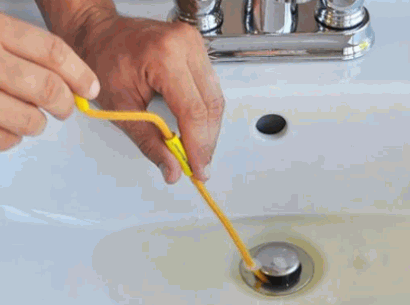
Why Do Sink Drains Get Clogged?
Sink drains get clogged due to various reasons, including the accumulation of food particles, grease, oil, hair, and soap scum. Understanding these causes can help in preventing clogs and maintaining a clean and functional drain.
Food particles are a common culprit in kitchen sinks, where scraps of vegetables, seeds, or even small pieces of meat can build up over time, restricting water flow. Grease and oil from cooking can solidify in the pipes, creating blockages that impede drainage. Hair is another major issue, especially in bathroom sinks or showers, as it easily clumps together with soap scum, forming tough clogs.
Regular maintenance, such as using drain covers, disposing of food scraps properly, and periodically cleaning the pipes with vinegar or baking soda can help avoid these clogging problems and ensure a smoothly running drain system.
Learn more: How To Clean Drain Of Dishwasher
Build-Up Of Food Particles
The build-up of food particles in sink drains is a common issue in many households, leading to slow drainage and potential clogs. Proper cleaning and maintenance can prevent this buildup and ensure smooth water flow.
Food particles often stick to the walls of the drain and can accumulate over time, causing blockages. One effective way to remove these particles is by using a mixture of vinegar and baking soda. Pour this down the drain, let it sit for a while, then flush it with hot water to break down the debris. Another handy trick is to use a plumber's snake to physically dislodge any stubborn clogs that are deeper in the drain.
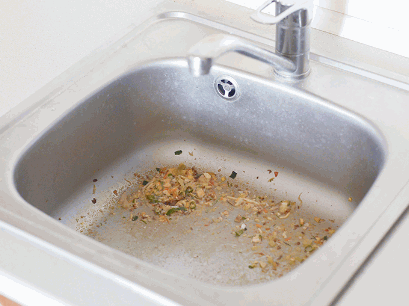
Accumulation Of Grease And Oil
Grease and oil accumulation in sink drains is a major contributor to clogs, especially in kitchen sinks where cooking residues often find their way into the plumbing. Regularly cleaning and degreasing the drains can help prevent blockages.
In kitchen sinks, the combination of food particles, fats, and oils creates a sticky residue that coats the pipes over time. This build-up not only restricts water flow but also provides a breeding ground for bacteria and unpleasant odors. To combat this, using specialized grease-fighting cleaners or natural solutions like baking soda and vinegar can effectively break down the greasy deposits. Installing a strainer or drain cover can help trap larger food particles and prevent them from entering the pipes.
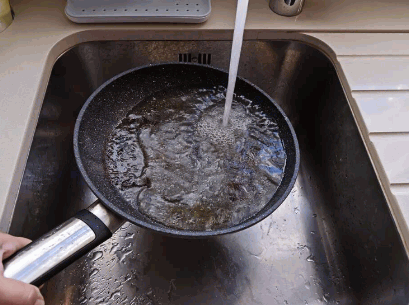
Hair And Soap Scum
Hair and soap scum can create stubborn clogs in bathroom sink drains, leading to water backup and unpleasant odors. Regular cleaning with suitable products can prevent these blockages and maintain a fresh-smelling drain.
When hair gets washed down the drain, it often combines with soap scum, forming a sticky residue that coats the pipes over time.
This residue then traps other debris passing through the drain, gradually building up and impeding the flow of water.
To effectively combat this buildup, it's recommended to use a drain snake or a mixture of baking soda and vinegar.
These natural remedies can help break down the clogs without harsh chemicals that may damage your pipes.
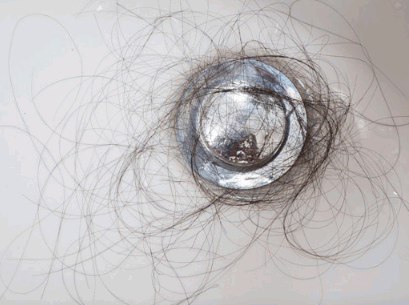
What Tools Do You Need To Clean Sink Drains?
Cleaning sink drains effectively often requires specific tools like a plunger, drain snake, baking soda, vinegar, or commercial drain cleaners. Having these tools on hand can help you tackle various clogging issues with ease.
A plunger is a versatile tool that uses suction to dislodge clogs in sinks. It works best for minor blockages caused by organic matter or soap scum. To use a plunger effectively, ensure a tight seal around the drain and use quick, vigorous plunges to create pressure changes that help release the blockage.
A drain snake, also known as a plumber's auger, is ideal for reaching deep clogs or removing hair and debris causing the obstruction. The flexible metal cable of a drain snake can navigate bends in the pipe and hook onto the blockage for removal.
Plunger
A plunger is a versatile tool for clearing clogs in sink drains by creating pressure to dislodge blockages. Knowing how to use a plunger correctly can save you from calling a plumber for minor drain issues.
There are different types of plungers available, such as cup plungers and flange plungers, each designed for specific drain types. To effectively use a plunger, start by ensuring a tight seal around the drain opening with the plunger cup. Plunging in a smooth, rhythmic motion will help generate enough pressure to push the clog through the pipes. For better results, fill the sink with enough water to cover the plunger cup. Remember to clean the plunger after each use and store it in a dry place to prevent contamination.
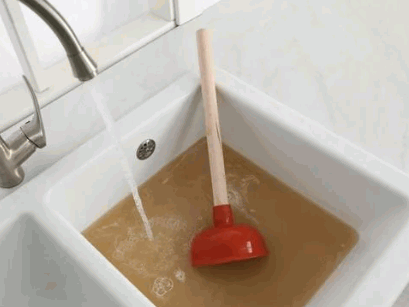
Drain Snake
A drain snake is a flexible tool that helps remove stubborn clogs deep within sink drains, especially those caused by compacted debris or hair. Using a drain snake requires proper technique to avoid damaging the pipes.
When faced with a clogged sink drain, a drain snake can provide a cost-effective solution before having to call a professional plumber. This tool is designed to navigate through the twists and turns of the pipes to break up blockages and allow water to flow freely again.
To use a drain snake properly, begin by inserting the auger end into the drain and rotating it clockwise while applying gentle pressure. As the snake moves further down the pipe, it will catch onto the clog, allowing you to pull it out slowly.
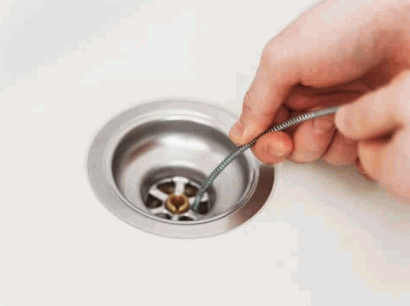
Baking Soda And Vinegar
Baking soda and vinegar offer a natural and effective solution for cleaning sink drains, breaking down organic matter, and eliminating odors. This DIY method is safe for pipes and the environment.
To utilize this eco-friendly cleaning method, start by pouring 1 cup of baking soda down the drain, followed by 1 cup of vinegar. Let the mixture sit for about 30 minutes to fizz and work its magic. After that, flush the drain with hot water to rinse away the residue, leaving your drain clean and fresh.
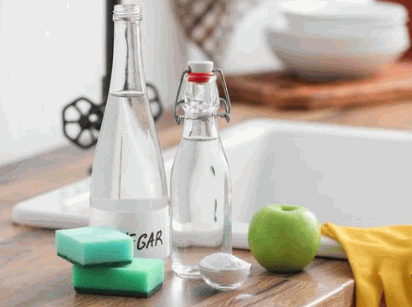
Commercial Drain Cleaners
Commercial drain cleaners are available in chemical-based and enzyme-based formulations, offering quick solutions for stubborn clogs. Understanding the safety and effectiveness of these cleaners is crucial before use.
Chemical-based drain cleaners contain powerful agents like sodium hydroxide or sulfuric acid that can dissolve blockages rapidly. They are effective for clearing severe clogs caused by grease, hair, or paper products. These cleaners can be harsh on pipes and may emit fumes harmful to humans and pets.
On the other hand, enzyme-based cleaners use naturally occurring bacteria to break down organic matter, making them safer for pipes and the environment. While enzyme cleaners require more time to work, they are gentle and eco-friendly options for regular maintenance.
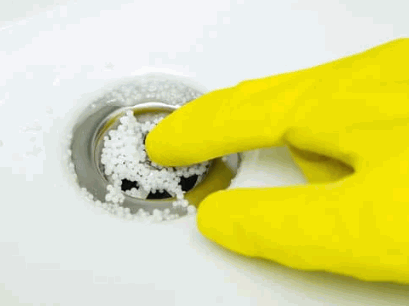
How To Clean A Sink Drain With A Plunger?
Cleaning a sink drain with a plunger is a straightforward DIY task that can quickly resolve common clogging issues. By following a few simple steps, you can restore proper drainage and prevent further blockages.
Start by removing any visible debris or hair near the drain entrance.
- Next, fill the sink with enough water to submerge the plunger.
- Place the plunger over the drain, ensuring a good seal, then push and pull vigorously to dislodge the blockage.
- If the clog persists, try plunging multiple times, alternating with hot water poured down the drain.
For more stubborn blockages, consider using a drain snake to break up the debris. If despite your efforts the drain remains slow or completely blocked, it may be time to seek professional help from a plumber to address potential deeper issues within the plumbing system.
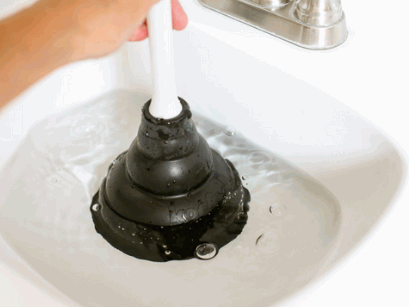
How To Use A Drain Snake To Clear Clogs In Sink Drains?
Using a drain snake to clear clogs in sink drains requires proper technique and caution to avoid causing damage.
You should ensure that the drain snake has the appropriate length to reach the clog.
- Next, carefully insert the snake into the drain until you feel resistance.
- Turn the handle clockwise to break through the obstruction.
Safety precautions are crucial during this process; wear gloves and safety goggles to protect yourself from any debris or splashes.
If you encounter a stubborn clog, gently maneuver the snake back and forth to dislodge it without exerting excessive force. It's essential to identify whether the clog is caused by organic matter like hair or grease, which may require a different approach for effective removal.
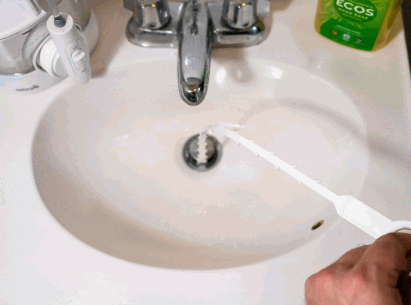
How To Clean Sink Drains With Baking Soda And Vinegar?
Cleaning sink drains with baking soda and vinegar is an eco-friendly and cost-effective method that helps eliminate odors and debris. This natural cleaning solution is simple to use and safe for regular maintenance.
Start by pouring 1/2 cup of baking soda down the drain, followed by 1/2 cup of vinegar. The mixture will fizz and bubble, which helps break down any buildup or clogs. Let it sit for about 30 minutes to allow the reaction to work its magic. Afterward, rinse with hot water to wash away the residue and any remaining debris.
One of the key benefits of using this method is that baking soda and vinegar are non-toxic and do not harm the environment or your plumbing system. Unlike chemical drain cleaners, these natural ingredients are gentle yet effective in cleaning and maintaining your sink drains.
To prevent future clogs, consider performing this quick cleaning routine once a month. Avoid disposing of grease, oil, or food scraps down the drain, as these can contribute to blockages over time. Being mindful of what goes into your sink can prolong the efficiency of your plumbing and reduce the need for harsh chemical cleaners.
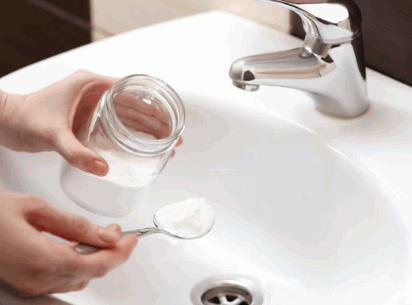
Are Commercial Drain Cleaners Safe To Use?
Understanding the safety considerations of using commercial drain cleaners is essential, especially when dealing with persistent clogs. Both chemical-based and enzyme-based cleaners have their advantages and limitations.
Chemical-based drain cleaners are known for their quick and powerful action in breaking down tough clogs; however, they contain harsh chemicals that can pose health risks if not handled properly. On the other hand, enzyme-based cleaners use natural enzymes to eat away at organic matter, offering a safer alternative without emitting harmful fumes. It's crucial to follow manufacturer instructions meticulously when using any type of drain cleaner to ensure effectiveness and prevent accidental exposure to hazardous substances.
Chemical-Based Cleaners
Chemical-based drain cleaners offer a quick solution for tough clogs but may contain harsh ingredients that can be damaging to pipes and harmful if misused. It is essential to follow safety guidelines when using these cleaners.
These cleaners work by dissolving the clogs in your pipes, often consisting of hair, grease, or soap scum. While effective, the strong chemicals in some cleaners can cause corrosion, leading to costly plumbing repairs.
When using chemical cleaners, make sure to wear protective gear like gloves and goggles to prevent skin and eye irritation. It is also important to ventilate the area well to avoid inhaling harmful fumes.
Alternative methods such as using a drain snake or a mixture of baking soda and vinegar can be safer for both your pipes and health.
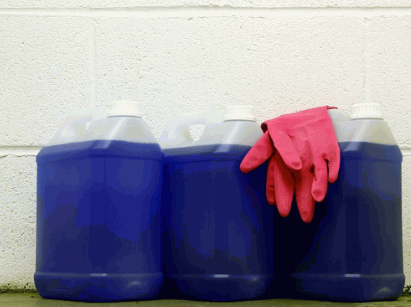
Enzyme-Based Cleaners
Enzyme-based drain cleaners utilize biological agents to break down organic matter, offering a safer and eco-friendly alternative to chemical cleaners. These cleaners are effective for regular maintenance and prevention of clogs.
Unlike harsh chemical drain cleaners that can cause damage to pipes and harm the environment, enzyme-based solutions work by introducing enzymes that target and digest organic debris, such as food particles, grease, and hair.
The enzymes in these cleaners break down the clogs gradually, preventing future blockages without the need for aggressive chemicals. Since they are made from natural ingredients, enzyme-based cleaners are gentle on plumbing systems and safe for septic tanks.
To use enzyme-based drain cleaners effectively, it is advisable to pour them down the drain at night to allow a longer contact time for the enzymes to work their magic. Regularly using enzyme cleaners can help maintain clean and clear drains, reducing the risk of costly plumbing issues.
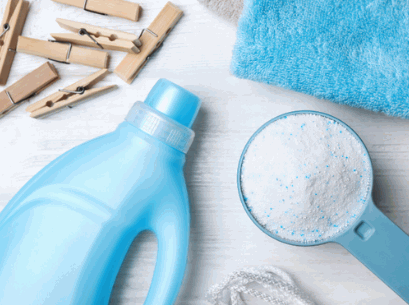
Tips For Preventing Clogs In Sink Drains
Preventing clogs in sink drains involves simple yet effective practices like using a sink strainer, avoiding pouring grease and oil down the drain, and maintaining regular cleaning routines. These preventive tips can help keep your drains clear and odor-free.
It's important to be mindful of what goes down the drain. Small food scraps, coffee grounds, and pasta can all contribute to clogs over time. You can scrape leftovers into the trash rather than rinsing them down the sink.
Proper waste disposal is key to preventing blockages. Establishing a cleaning schedule for your drains, such as flushing them with hot water and vinegar once a month, can also help break down potential build-up and maintain optimal drainage flow.
Use A Sink Strainer
Using a sink strainer is an effective way to prevent debris, food particles, and other substances from entering the drain and causing clogs. This simple device can significantly reduce the risk of blockages and plumbing issues.
When water flows through the sink, the strainer catches solid particles, allowing only liquid to pass through. This helps maintain a healthy drainage system and extends the lifespan of your pipes. By preventing larger objects from going down the drain, you also minimize the chances of encountering costly plumbing repairs. Investing in a quality sink strainer can save you time, money, and the hassle of dealing with stubborn clogs in the long run.
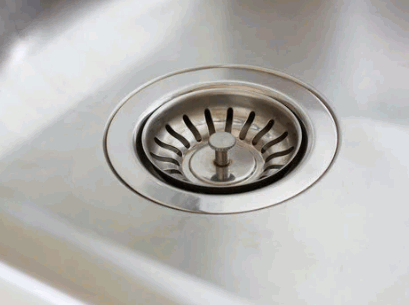
Avoid Pouring Grease And Oil Down The Drain
To prevent clogs in sink drains, it is crucial to avoid pouring grease and oil down the drain, as these substances can solidify and block the plumbing over time. Proper disposal methods can help maintain a clean and functional drain system.
When grease and oil are poured down the drain, they may seem harmless at first, but as they cool, they harden and adhere to the walls of the pipes, leading to the accumulation of debris and causing blockages. These blockages can result in slow drainage, foul odors, and even expensive repairs. It is essential to adopt alternative disposal solutions such as collecting and storing used cooking oil in a container and then disposing of it in designated receptacles or recycling centers.
Regularly Clean The Drain
Regularly cleaning the drain is an essential maintenance task that helps prevent clogs and maintain optimal drainage. Establishing a cleaning routine can keep your sink drains clear of debris and odors.
Experts recommend cleaning your drains at least once a month to prevent buildup and potential blockages. A simple and effective method is to pour boiling water down the drain followed by a mixture of baking soda and vinegar to break down grease and grime. Another helpful tip is to use a drain snake to physically remove any stubborn clogs. Maintaining clean drains not only promotes good hygiene but also extends the lifespan of your plumbing system, saving you from costly repairs in the long run.
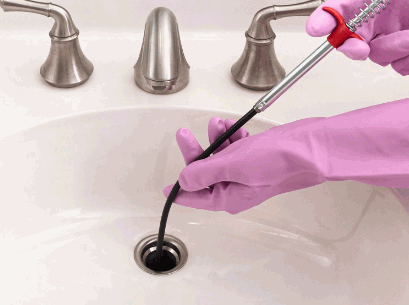
Conclusion: Importance Of Keeping Sink Drains Clean
Maintaining clean sink drains is crucial for ensuring proper drainage, preventing clogs, and promoting household hygiene. By following simple cleaning practices and preventive measures, you can extend the longevity of your plumbing system.
Regular cleaning of sink drains not only prevents unpleasant odors and blockages but also reduces the risk of potential water damage and mold growth in your home.
Keeping your drains clean and clear can help maintain the overall efficiency of your plumbing system, saving you from costly repairs in the long run.
To ensure optimal drain health, consider using eco-friendly drain cleaners or simple homemade solutions like vinegar and baking soda.
Remember to avoid pouring grease, coffee grounds, or other solid materials down the drain to prevent buildup and maintain smooth water flow.
Investing in a sink strainer can help trap debris before it enters the drain and causes blockages, making your cleaning routine more effective and hassle-free.


